

Psychological abuse. Psychological abuse or emotional abuse refers to the humiliation or intimidation of another person, but is also used to refer to the long-term effects of emotional shock.Psychological abuse can take the form of physical intimidation, controlling through scare tactics and oppression.

It is often associated with situations of power imbalance, such perhaps as the situations of abusive relationships and child abuse; however, it can also take place on larger scales, such as Group psychological abuse, racial oppression and bigotry. A more "mild" case might be that of workplace abuse. You may, in turn, feel: • Worthless. • Dependent on the abuser. • Confused. • Sad. • Angry. • Isolated. • A loss of control over your life.How can I deal with this on my own? If you feel unsure of whether you are being abused, confide in friends or relatives whom you find emotionally supportive and whose opinion you trust.
Simply put, psychological abuse is abuse that damages the psyche, or the mind. Psychologically Abusive Relationships: Are You in One? Signs of Emotional Abuse and what you can do about it. It is easy to get wrapped up in the ups and downs of emotionally abusive relationships.
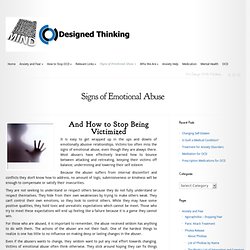
Victims too often miss the signs of emotional abuse, even though they are always there. Most abusers have effectively learned how to bounce between attacking and retreating, keeping their victims off balance; undermining and lowering their self esteem Because the abuser suffers from internal discomfort and conflicts they don’t know how to address, no amount of logic, submissiveness or kindness will be enough to compensate or satisfy their insecurities.
They are not seeking to understand or respect others because they do not fully understand or respect themselves. They hide from their own weaknesses by trying to make others weak. For those who are abused, it is important to remember, the abuse received seldom has anything to do with them. Even if the abusers wants to change, they seldom want to put any real effort towards changing. Verbal Abuse Journals - Verbal Abuse Is Domestic Abuse That Leads to Physical Violence. Addictive Love. The basis for a healthy relationship with another must start with a healthy relationship with yourself.
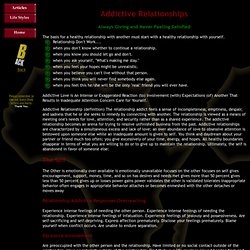
Addictive Love is An Intense or Exaggerated Reaction (to) Involvement (with) Expectations (of) Another That Results in Inadequate Attention Concern Care for Yourself. Addictive Relationship (definition) The relationship addict feels a sense of incompleteness, emptiness, despair, and sadness that he or she seeks to remedy by connecting with another. The relationship is viewed as a means of meeting one's needs for love, attention, and security rather than as a shared experience. The addictive relationship becomes an arena for trying to resolve unfinished business from the past. Addictive relationships are characterized by a simultaneous excess and lack of love; an over abundance of love to obsessive attention is bestowed upon someone else while an inadequate amount is given to self. The Self Relationship Addictive Responses Overreacting Excessive Involvement Unrealistic Expectations.
How to Love Again After Being Hurt. So you were in a relationship, and now it’s all over.
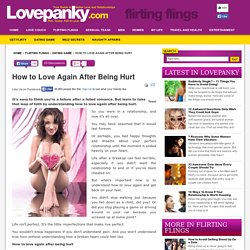
You may have assumed that it would last forever. Or perhaps, you had happy thoughts and dreams about your perfect relationship until the moment it ended heavily on your heart. 9 Signs That Your Relationship May Be Doomed. When you’re in love, your heart feels like it's windsurfing, and everything is magical and tinted whatever color is the opposite of regret (beige?).
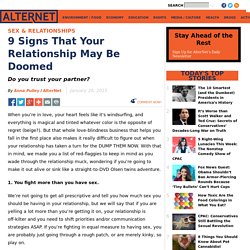
But that whole love-blindness business that helps you fall in the first place also makes it really difficult to figure out when your relationship has taken a turn for the DUMP THEM NOW. With that in mind, we made you a list of red-flaggies to keep in mind as you wade through the relationship muck, wondering if you’re going to make it out alive or sink like a straight-to-DVD Olsen twins adventure. 1. Coping With A Narcissist - Information Guide to Narcissism. What It Means To Be With a Narcissist and One Way of Coping About You It isn’t easy being you.
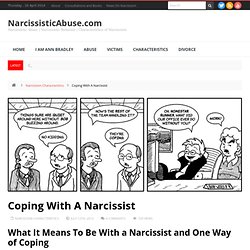
You might be unsure yourself if you are with an abuser because they can so easily turn on the charm or maybe they might say, “C’mon, aren’t you being too sensitive? What’s the matter with you?” And there you are again, back in the cycle of abuse. Ending the Toxic Relationship and Giving Yourself Time and Space to Find Yourself. Photo credit: AmyJanelle Some relationships are deeply damaging and unhealthy for the people within the relationship.
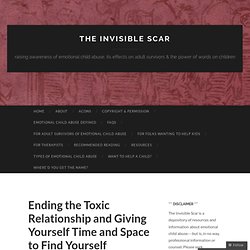
Unlike healthy relationships, which have peaks and lows, which have struggles now and then, a toxic relationship is poison to the people involved. But what happens if the toxic relationship is within the family sphere? 13 Signs Your Wife or Girlfriend is a Borderline or a Narcissist. My girlfriend / wife doesn’t have a personality disorder.

She’s just emotional. Maybe, maybe not. Borderline Personality Disorder isn’t as mainstream in public awareness as other psychiatric diagnoses, but it’s a very real problem that affects many individuals and the people who are in ongoing relationships with them or trying to end relationships with them. Narcissistic Personality Disorder is a kissing cousin of BPD. There is usually some overlap between the two.